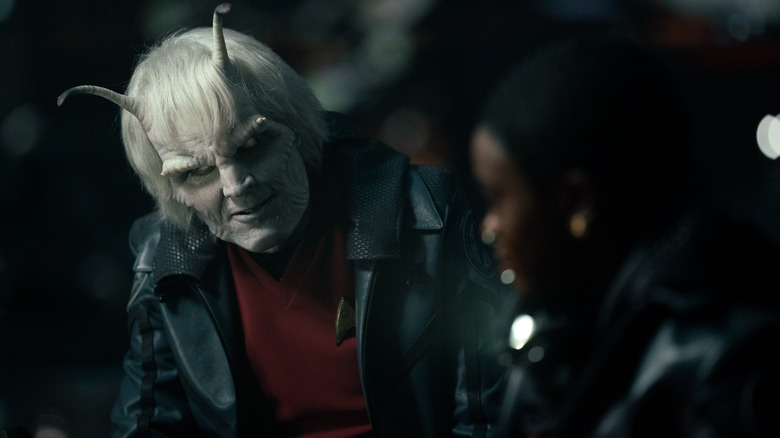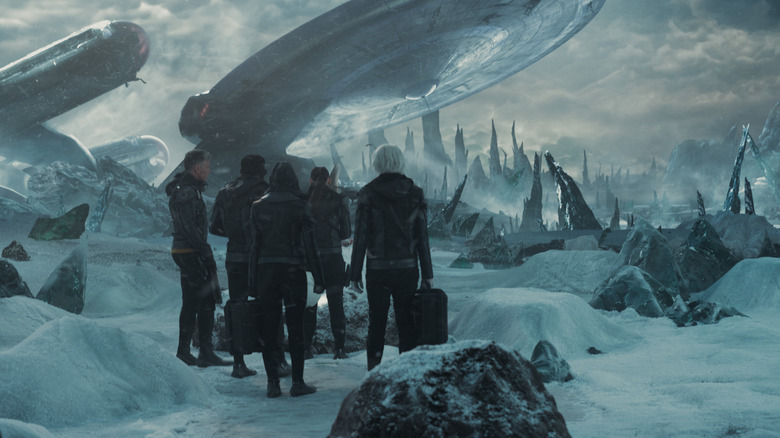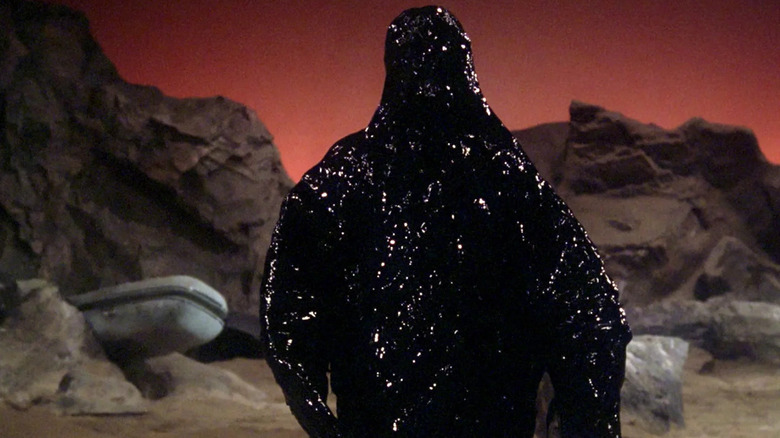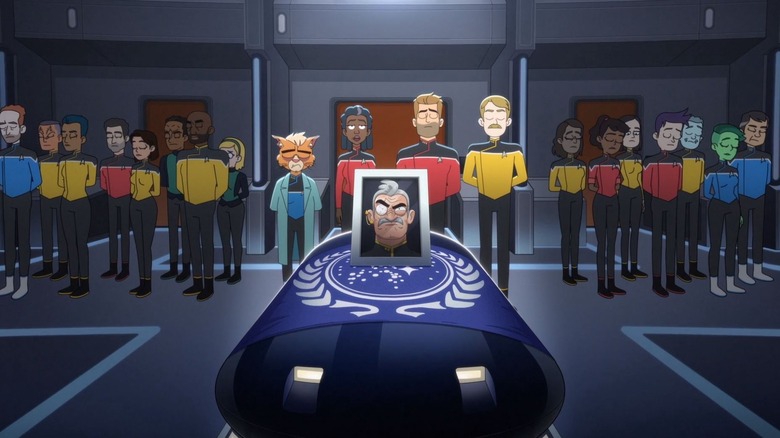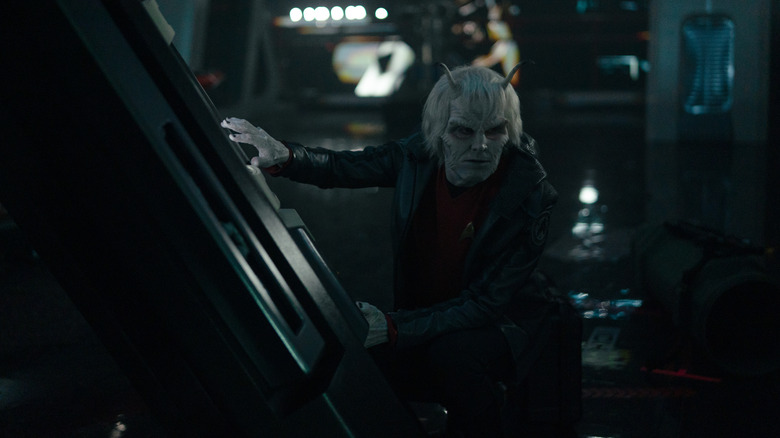We Need To Talk About That Devastating Moment In This Week's Star Trek: Strange New Worlds
This article contains major spoilers for "All Those Who Wander," the ninth episode of "Star Trek: Strange New Worlds."
The ninth episode of "Star Trek: Strange New Worlds" is essentially a horror movie reminiscent of Ridley Scott's "Alien," but it also keeps with the early Trek tradition of depicting horrible things happening to people. In early Trek, the Enterprise crew could have their faces magically erased, their salt drained by a shape-shifting vampire, or their bodies dehydrated into geodesic blocks. While "The Elysian Kingdom," the previous episode of "Strange New Worlds," was a bout of light whimsy (the crew was magically transformed into characters from a fantasy novel), "All Those Who Wander" features the return of the Gorn, last seen in "Memento Mori," and depicts them as vicious biological oddities who implant their young in living host bodies.
Not only are the monsters a reference to "Alien," the premise is too: The Enterprise receives a distress beacon from a downed starship called the U.S.S. Peregrine, crashed on a class L planet. The Enterprise, in a rush to deliver power cells with an expiration date, leaves a landing party behind in a communications dead zone to investigate. They find few survivors, an alien they cannot communicate with, a young girl (echoes of New from James Cameron's "Aliens"), and an encroaching litter of Gorn young, at a stage in their youth when they are more or less feral miniature dinosaurs.
Poor Hemmer
By the end of the episode, multiple crewmates have been injured or killed, and the Enterprise's grumpy Aenar engineer Hemmer (Bruce Horak) has become infected with Gorn spores, his body serving as host to a potential new litter. Rather than offer an additional threat to an already-desperate situation, Hemmer elects to exit the ship and fall off a cliff to his death. Before falling, he takes a brief moment to appreciate the frigid weather around him. Just like his home planet, Andoria.
Hemmer's death is an unexpectedly tragic moment on "Strange New Worlds," as he was, up to this point, a member of the core cast. While Trek would occasionally kill off a crewmate to accentuate the danger of the job — there's a reason Red shirts have become a pop culture staple — it's rare that a central character on a Trek show is ever killed. It's happened so infrequently, you can count the instances on one hand.
A Trekkie's mind may immediately jump to the "Star Trek: The Next Generation" episode "Skin of Evil," a notoriously dark episode wherein the Enterprise's security chief Lt. Tasha Yar (Denise Crosby) is unceremoniously killed by a powerful, sentient blob of tar calling itself Armus. Yar's death happened quickly, had no build-up, and occurred before the halfway point of the episode. And, since the crew was still trapped in a precarious scenario, no one had time to properly mourn or even comment on her death. It wouldn't be until an epilogue that the crew could properly memorialize her.
Skin of Evil
One can be of two minds on "Skin of Evil." Yar's death was, of course, anticlimactic, which was intentional. The point was that losing a senior member of the crew on an away mission is certainly a possibility as a Starfleet officer, and not everyone is going to have a heroic moment prior to their dying. Just like real life. One can die just by falling down a staircase one day. That abruptness reveals that death is indeed part of the Trek universe, and that it can just ... happen. The showrunners, however, in failing to pause on the death of a major character — to give her a heroic moment or a second of defiance — did her something of a disservice. Practically, Yar dying made sense. Dramatically, well, it does leave one wanting more.
The memorial service was tasteful, one might suppose, but it was perhaps too sentimental a moment after too abrupt a death. When one learns why Crosby left the show — she felt she was too much of a background character and not enough of a lead — it becomes all the more anticlimactic. Luckily, Crosby would return multiple times, thanks to (actually clever) alternate timeline shenanigans.
But her actual death lost a lot of its sting for its abruptness.
No Small Parts
More tactful was the death of Lt. Shaxs (Fred Tatasciore), the hulking Bajoran security chief on the U.S.S. Cerritos on "Star Trek: Lower Decks." In the episode "No Small Parts," Shaxs — an overwhelmingly violent man — takes perhaps a little too well to a sudden threat to his ship. Shaxs dies in a fiery explosion while rescuing a crewmate from an onslaught by the Pakleds. It was the kind of badass ending that the character seemingly warranted; there was no way Shaxs was going to go quietly.
But, since "Lower Decks" is a comedy show, Shaxks death was undone in a deliberately undramatic way. The main characters on "Lower Decks" are the ship's lower-ranking officers, the ones who have to do unglamorous grunt work while the senior staff gets to have cosmic adventures. Said adventures are rarely communicated to the ensigns, so the main cast has to live with the fact that they may simply never know what the bridge crew is up to. This conceit is played with brilliantly when Shaxs comes back to life ... and no one explains how. He's merely back, and the ensigns have been warned not to ask what happened, as it would be gauche. The audience never learns. That's hilarious.
Just like Andoria
Hemmer does not have as heroic death, but he did die committing a noble act. A mission that was meant to be a brave rescue ended up being devastating, with no one expecting a life-threatening situation, forcing Hemmer to come around on his mortality in a moment's notice.
What Hemmer is given that Tasha Yar never had was a moment to face death with dignity. Hemmer is given several minutes to acknowledge the gravity of his situation — to understand what's happening to him — and to make a decision based on the situation. As a professional Starfleet officer, he is able to face his final moments with clear judgment, knowing he could spare his fellow officers from further risk. And even though it was only a moment, Hemmer is able to take a final peaceful breath of freezing cold air, granting himself a moment of peace.
Of course, while these moments may have spelled dignity for Hemmer, it is incredibly tragic for the audience. A character we were just growing to like died rather than risk hurting his fellow officers. Bruce Horak was doing a wonderful job in the part, and Hemmer had added just the right dynamic to the show. To see him taken out leaves the viewer feeling sad, yes, but concerned that the crew will not be able to recover, either practically or dramatically.
The next episode is the season finale, so audiences will have to see how well everyone recovers.
